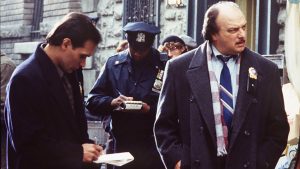A few weeks ago, I mentioned that I was recording and binge-watching reruns of “NYPD Blue” that air in a four-hour middle-of-the-night block on the H&I channel. Last week, I stopped, because I just couldn’t view Andy Sipowicz (Dennis Franz) and his fellow detectives in a positive light anymore.
It wasn’t just the blatant racism, which was more apparent in the first few years than towards the end of its 12-year run, during which the squad room had exactly two Black cops. It was also the lack of consequences for Sipowicz’s actions — and those of his colleagues, from John Kelly (David Caruso) to Bobby Simone (Jimmy Smits) to Baldwin Jones (Henry Simmons).
Derek Chauvin, the cop who killed George Floyd, would have fit right in. Suspects were routinely beaten up in interview rooms to force them to confess. Investigators from internal affairs were openly sneered at with derision whenever they dared to look into bad cops through the “blue wall.” Constitutional rights be damned as long as the detectives of the 15th precinct won.
Still, despite Sipowicz’s transgressions and flaws being on full display, they didn’t keep him from having romantic relationships. Assistant District Attorney Sylvia Costas (Sharon Lawrence) in the early years and Detective Connie McDowell (Charlotte Ross) much later were not only attracted to Andy, they both married him — despite repeatedly witnessing his repulsive conduct.
Their affection for him softened Sipowicz’s image, making him look like a good guy, even after a day of treating non-cops like garbage. That sent a message to viewers, that no matter what Andy and other police characters on TV did wrong, you still had to love and respect them.
If “NYPD Blue” got away with promoting such pro-cop propaganda, it was nothing compared to “Cops,” which was finally cancelled yesterday. I didn’t even know it was still on the air, but good riddance.
The cinéma vérité show debuted more than 30 years ago as a network’s antidote to a TV writer’s strike. Not only did it not need writers because its cameras merely followed police officers on their regular patrols, it was also really cheap to produce. “Cops” would not have been possible without the cooperation of police departments around the country, so it tended to show cops in a mostly positive light. Even when viewers could see cops bending and breaking the law in their treatment of citizens, it was never treated as a problem.
Not only that, the show promulgated racism with its rotating corps of mostly white officers interacting more often than not with people of color, and the former knew that going soft on the latter did not make for good TV. “Cops” also showed people being arrested for crimes they may not have committed, for which they were later released, but there they were on TV having their reputations tarnished in primetime (and in reruns).
At the same time that Paramount has yanked “Cops,” A&E has cancelled its top-rated show, “Live PD,” a series very much in the same tradition. The producers claimed these shows made police work more transparent, but what they don’t say is that they gave departments the right to excise footage they didn’t want the public to see. What I find amusing about both shows is that police officers were willing to have TV cameras riding along and recording everything they did throughout a shift, but in the real world, they make a huge fuss about being forced to turn on their body cameras — and insisting that they be allowed to turn them off when not dealing with the public.
Though labelled “reality TV,” “Cops” and “Live PD” were slickly edited and produced to portray law enforcement favorably, just like “NYPD Blue” and so many other series, all the way back to “Dragnet.” I don’t watch any current cop shows, but I’ll openly admit that I used to really like “NYPD Blue,” “Hill Street Blues,” and some others that filled my television screen.
But those are images I just can’t abide any longer.
Now the question is whether other networks will take a serious look at what populates their primetime schedules and end up cancelling their police procedurals. Or whether they’d dare to produce anything resembling those older shows.

